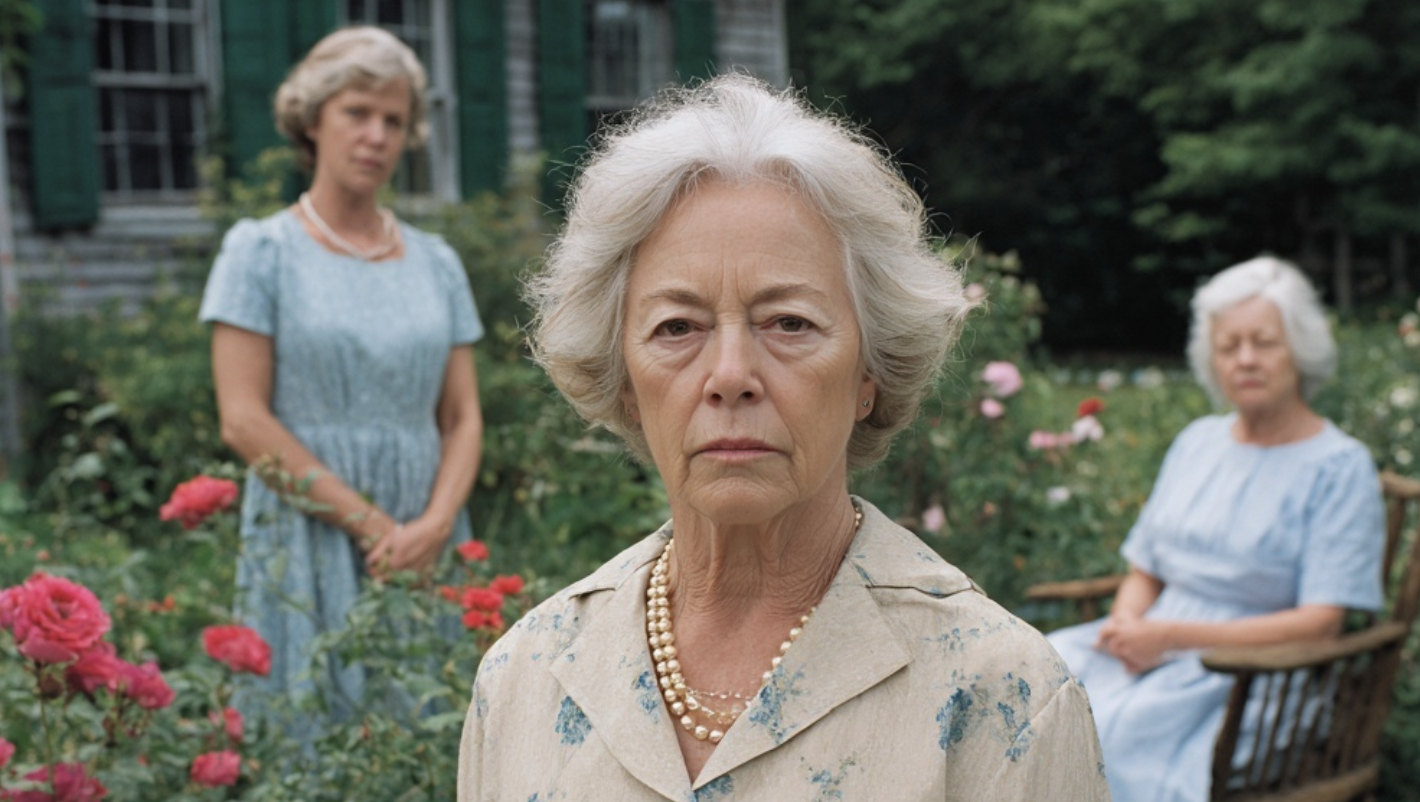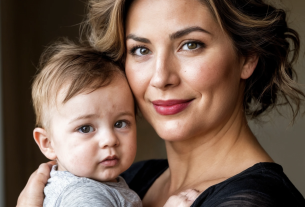Anna carefully parted the curtain and looked out the window. The familiar white Logan pulled up to the gate, and behind it came two more cars. The girl’s heart clenched in exasperation. Again.
“Seryozha,” she called to her husband, who was fixing the kitchen faucet at the time. “Your mother’s here. And she’s not alone.”
Sergey peeked out from behind the table, wiping his hands on a towel.
“Again? We agreed she’d give us a heads-up.”
Anna gave a bitter smirk. Agreed… As if Valentina Petrovna had ever stuck to an agreement when someone else’s interests were involved.
Just six months ago everything was different. Her mother-in-law would call occasionally on holidays, sometimes drop by their city apartment, but kept her distance. Anna even thought the woman didn’t much care for her. And that was quite bearable—they lived their own lives, and Valentina Petrovna lived hers.
Everything changed when Anna’s grandmother died and left her a country cottage in a picturesque spot on the riverbank. The house was small but cozy, with a veranda draped in grapevines, an apple orchard, and tidy garden beds. Since childhood Anna had spent her summers there and loved the place dearly.
Less than a week after the inheritance paperwork was finalized, Valentina Petrovna showed up on the cottage doorstep.
“I decided to visit my son,” she announced, entering the house uninvited. “To see how you’ve settled in here.”
Anna was a well-bred girl. She set the table, brewed tea, and brought out homemade jam. Valentina Petrovna left satisfied.
“See how hospitable you can be when you want to be,” she praised her daughter-in-law. “That’s how guests should be welcomed.”
The next time, the mother-in-law came with her sister. Then with a friend from the next building. Then with three friends at once. Each time she declared she’d come to visit her son, and it was Anna who had to receive and entertain the guests.
“Annushka, dear,” Valentina Petrovna would say, settling into the wicker chair on the veranda, “could you put the kettle on? And something to go with the tea. I’m sure you’ve got something tasty.”
Anna would put on the kettle, slice the pie she’d baked for herself and her husband, and take out jars of jam she herself had made. The guests praised the treats, admired the river view, and Valentina Petrovna would nod importantly, as if it were all thanks to her.
“The place we have here is wonderful,” she would say. “And the house you got is a good one. Isn’t that so, Annushka—weren’t you lucky with your inheritance?”
After such visits, Anna would clear the dishes, wash the cups, sweep the veranda, and think about how her day off had once again gone nothing like she’d planned. Instead of reading a book in the hammock or weeding the beds, she had to play waitress for uninvited guests.
Sergey sympathized with his wife but didn’t dare take any serious action.
“What do you want me to do?” he’d say. “She’s my mother. And besides, they’re only here for a couple of hours.”
“For a couple of hours?” Anna would protest. “Yesterday they sat here from half past ten to seven in the evening! I ran around after them all day! Cook this, take that away, bring this!”
“You’re exaggerating,” Sergey would wave his hand. “So you made tea, took out a few things for the table. Not that big a job.”
But Anna knew exactly what kind of work it was. Set the table for five, then clear it all, wash the dishes, air out the rooms from cigarette smoke (Valentina Petrovna’s girlfriends smoked), gather and take out the trash. And on top of that, listen to lectures about how to run a proper household, which flowers to plant, and why young people these days are utterly spoiled.
The advice was the most grating. Valentina Petrovna loved to give instructions.
“Annushka, why is your table such a mess? I always keep mine tidy.
“Annushka, why haven’t you pruned the roses? It’s already August—it’s time.
“Annushka, isn’t it time you thought about having a baby? Sergey is already thirty.”
At the last remark, Anna kept silent, though she was boiling inside. What business was it of her mother-in-law’s what plans she and her husband had? And in general, what right did she have to order people around in someone else’s home?
What was worst was that Valentina Petrovna clearly regarded the dacha as some sort of family property. She told her friends what a wonderful place “they” had, how cozy “their” house was, how beautiful “their” garden. “We,” “our dacha,” “our plot”—that’s how she spoke, as if forgetting that the house had come to Anna by inheritance from her grandmother.
And today the story was repeating itself again. Anna had planned to weed the beds in the morning, then swim in the river and read a new book. Instead, she was about to be stuck entertaining her mother-in-law and her friends.
“Maybe we should go out to them?” Sergey suggested, buttoning his shirt. “At least say hello.”
“Go,” Anna answered curtly. “I’m busy.”
She ostentatiously took a swimsuit and beach towel from the closet. It was hot outside, the river beckoned with coolness, and Anna was determined that today she would do what she’d planned.
The voices on the veranda were getting louder. Valentina Petrovna was explaining something to her friends; they cooed in admiration. Then footsteps sounded, and Sergey came into the house.
“Mom says they’re hungry from the trip,” he reported in a guilty tone. “Could you make something?”
But Anya stuffed the swimsuit into her beach bag and headed resolutely for the door.
“Where do you think you’re going?! You have guests!” the mother-in-law exclaimed, appearing in the doorway.
Anna stopped and slowly turned. Valentina Petrovna stood with an outraged expression, and behind her loomed the curious faces of her companions.
“Guests?” Anna repeated, steel in her voice. “Guests are those who are invited. Guests are those who are expected. Guests are those who ask permission before they come. People who show up unannounced as if it were their own home and demand to be fed are not guests. They are freeloaders.”
Valentina Petrovna opened her mouth in indignation, but Anna didn’t let her interrupt.
“Do you want to know where I’m going? I’m going for a swim. To the river, beside my house, which I inherited from my grandmother. And you, Valentina Petrovna, can treat your friends to whatever you like—but on your dime and with your own hands. There’s sausage and cheese at the shop nearby; you’ll find bread there too and anything else you want, and the tea is in the cupboard. Don’t be shy!”
“How dare you…”
“How dare I?” Anna took a step forward, and her mother-in-law instinctively stepped back. “And how dare you come here every weekend with your girlfriends and turn my home into a free boarding house? How dare you dispose of my time, my groceries, my home? How dare you lie to your acquaintances that this is your dacha?”
Valentina Petrovna’s friends exchanged glances. One of them coughed awkwardly.
“Valya, maybe we really did come at a bad time…”
“Oh, not at all!” Valentina Petrovna protested hotly, but her voice no longer had its former confidence. “We’re family! Anechka is just tired, that’s why she’s talking nonsense.”
“Nonsense?” Anna laughed, but it wasn’t a cheerful laugh. “Nonsense is thinking you can take advantage of someone else’s kindness forever with impunity. Nonsense is assuming that if someone kept quiet once, they’ll keep quiet forever. Nonsense is promising your girlfriends a nice getaway at someone else’s expense.”
The last phrase hit home. Valentina Petrovna flushed, and her companions looked at her with interest.
“So this isn’t your dacha?” one of them asked.
“Of course it’s ours!” Valentina Petrovna exclaimed. “I mean… it’s the family dacha… my son…”
“My son has nothing to do with it,” Anna said firmly. “This dacha belongs to me. To me alone. And I alone decide whom to receive here.”
She headed for the gate, but turned back at the exit.
“By the way, Valentina Petrovna. Tell Sergey that if he wants dinner, he’ll find me by the big rock downstream. And I’m asking you to leave my house before I return.”
“Anna!” Sergey called, but his wife had already slipped out through the gate.
The walk to the river took about ten minutes through a little pine grove. Anna walked quickly, feeling the tension ease with each step. At last she had said everything she thought. At last she had put her mother-in-law in her place.
By the water it was quiet and cool. Anna undressed, stepped into the river, and swam toward the middle. The water was warm from the August sun, the current gently embracing her body. She rolled onto her back and looked up at the sky where white clouds drifted.
About an hour later Sergey appeared on the bank. He sat down on the grass next to his wife’s things and was silent for a long time.
“They left,” he said at last.
“All of them?” Anna asked, coming out of the water.
“All of them. Mom said she won’t come here anymore. That you insulted her and humiliated her in front of people.”
Anna dried off with a towel and didn’t answer.
“And her friends asked why I hadn’t warned them that this was your dacha,” Sergey went on. “I felt awkward.”
“You felt awkward?” Anna turned to her husband. “And how do you think it felt for me to turn into hired help every weekend? How did it feel to listen to your mother claiming my house as her own?”
Sergey sighed.
“You’re right. I should have stepped in earlier. I’m sorry.”
They sat on the bank, listening to the lapping water and the rustle of reeds. The sun was sinking toward the horizon, tinting the sky pink.
“You know,” Anna said, “I didn’t want to hurt her. But I couldn’t tolerate it any longer. Better she think I’m a bad daughter-in-law than have me hate her for what she’s doing to my life.”
“She won’t come again,” Sergey repeated. “Definitely won’t.”
Anna nodded. There was a touch of sadness—the relationship with her mother-in-law was finally spoiled. But there was also relief. For the first time in many months she could plan her weekends without fear that at any moment a white Logan would drive into the yard with a company of hungry guests.
“Shall we go home?” Sergey suggested. “I’ll make dinner.”
“Okay,” Anna agreed. “Only first I’ll call my mother. I’ll tell her we’ll come to see her tomorrow. As simple as that—I’ll call and ask whether we can come. The way well-mannered people do.”
Sergey smiled.
“Hint taken.”
They walked home along the path through the woods, hand in hand. The dacha greeted them with silence and calm. Crumpled cushions in the chairs and a few cigarette butts in the ashtray remained on the veranda—the only traces of the recent guests.
Anna cleared the butts and fluffed the cushions. Tomorrow she would tend the beds, as planned. The day after tomorrow she would get to the new book she had long wanted to read. Or maybe she would invite her friend Olga—the one who always gives advance notice of a visit and invariably brings something for tea.
Real guests. Welcome guests.
In the evening, as they sat on the veranda drinking tea, Anna thought that sometimes you have to find the courage to say “no.” It may seem rude; people may take offense—but the right to your own life is worth more than someone else’s approval.
Valentina Petrovna never came to the dacha again. Sometimes they met in the city at family celebrations, and the mother-in-law was pointedly cold. But that didn’t upset Anna. She had her own dacha, her own weekends, and her own right to decide whom to let into her life.
And the right to say “no” is a part of happiness, too.



